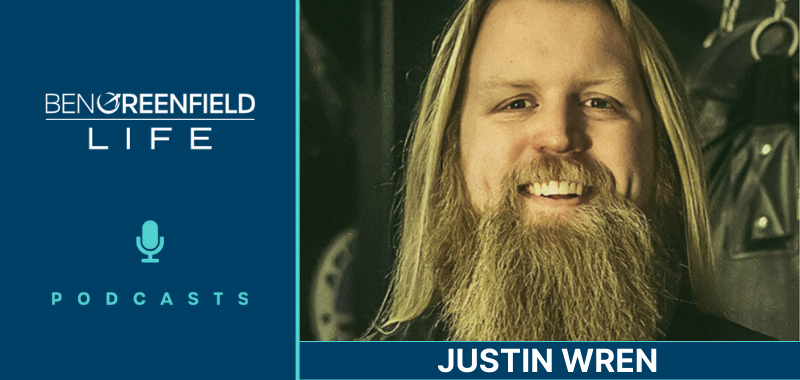April 26, 2017
Click here for the full written transcript of this podcast episode.
In 490 BCE, some masochistic Greek guy named Pheidippides ran for 36 hours straight from Athens to Sparta to seek help in defending Athens from a Persian invasion in the Battle of Marathon. In doing so, he saved the development of Western civilization and inspired the birth of the marathon as we know it. Even now, some 2,500 years later, that run stands enduringly as one of greatest physical accomplishments in the history of mankind.
Dean Karnazes, my guest on today's podcast, came up with the crazy idea of honoring Pheidippides (and Dean's own Greek heritage) by recreating this entire ancient journey in modern times. During his run, Karnazes even abstained from contemporary endurance nutrition like sports drinks and energy gels and only ate what was available in 490 BCE, such as figs, olives, cured meats and even some stuff called “mastic gum”.
Then he wrote about the whole experience is his new book “The Road to Sparta: Reliving the Ancient Battle and Epic Run That Inspired the World's Greatest Footrace“.
The new book is intriguing, comical, sometimes tear-jerking, and certainly thought-provoking and entertaining, and Dean is probably even more intriguing. Get a load of this guy…
TIME magazine named Dean one of the “Top 100 Most Influential People in the World.” Men’s Fitness hailed him as one of the fittest men on the planet. Stan Lee called him, “Super Human.” He's an acclaimed endurance athlete and NY Times bestselling author, who has pushed his body and mind to inconceivable limits. Among his many accomplishments, he has run 350 continuous miles, foregoing sleep for three nights. He’s run across the Sahara Desert in 120-degree temperatures, and he’s run a marathon to the South Pole in negative 40 degrees. On ten different occasions he’s run a 200-mile relay race solo, racing alongside teams of twelve. He has swum the San Francisco Bay, scaled mountains, bike raced for 24-hours straight, and surfed the gigantic waves off the coast of Hawaii & California.
His long list of competitive achievements include winning the world’s toughest footrace, the Badwater Ultramarathon, running 135 miles nonstop across Death Valley during the middle of summer. He has raced and competed on all seven continents of the planet, twice over. In 2006 he accomplished the seemingly impossible by running 50 marathons, in all 50 US states, in 50 consecutive days, finishing with the NYC Marathon, which he ran in three hours flat!
In 2011 Dean ran 3,000-miles from the coast of California to New York City, averaging 40 to 50-miles per day (one day covering more than 70!). Along the way he stopped at schools to speak to students about the importance of exercise and healthy eating. When passing through Washington DC, he was invited to run through the White House to meet with First Lady Michelle Obama and be honored for his tireless commitment to helping this country get back in shape.
Dean and his incredible adventures have been featured on The Today Show, 60 Minutes, The Late Show with David Letterman, CBS News, CNN, ESPN, The Howard Stern Show, NPR’s Morning Edition, Late Night with Conan O’Brien, the BBC, and many others. He has appeared on the cover of Runner’s World, Outside, and Wired magazine’s, and has been featured in TIME, Newsweek, People, GQ, The New York Times, USA TODAY, The Washington Post, Men’s Journal, Forbes, The Chicago Tribune, The Los Angeles Times, and the London Telegraph, to mention a few. Dean is the winner of an ESPN ESPY and a 3-time recipient of Competitor magazines Endurance Athlete of the Year award.
Dean has also raised millions of dollars for charity and was awarded the prestigious Community Leadership Award by the President’s Council on Physical Fitness & Sports.
During our discussion, you'll discover:
-Why it is a myth that Pheidippides ran 26.2 miles…[14:50]
-How humans can actually outrun horses…[19:30]
-Whether Dean ran barefoot or in leather sandals in the same way that Pheidippides did…[22:30]
-The hardest part of Dean's entire run…[30:45]
-How it went for Dean to eat for this race different than he ate for your other races, and why he chewed on something called “mastic gum”…[38:55]
-How Dean ran for 70+ miles with no food…[41:15]
-Why Dean adds rosemary to his coffee and consumes large amounts of wild salmon…[46:15]
-How Dean recovers so darn fast between his events, and why he bulked up before his 50 marathons in 50 days…[51:00]
-Why Dean splits his day into multiple 12-14 minute body weight workouts, and what his exact routine is…[53:00]
-How Dean manages with such little sleep when running marathons over multiple days…[57:50]
-Dean's take on all the talk about chronic cardio being bad for testosterone levels, increased risk of mortality, etc…[63:05]
-And much more!
Resources from this episode:
-Dean's book: The Road to Sparta: Reliving the Ancient Battle and Epic Run That Inspired the World's Greatest Footrace
–My Waterlogged interview with Dr. Tim Noakes
–Earthrunners sandals that Ben wears
–The mastic gum capsules that Ben and Dean talk about
–The chewable mastic gum straight from Greece that you can order from Amazon
–The fat based energy gel article that Ben wrote
–The Elliptigo elliptical trainer that Dean and Ben use
–The Oura ring Ben uses to track his sleeping
Do you have questions, thoughts or feedback for Dean or me? Leave your comments below and one of us will reply!














No no no — Pheidippides ran to Sparta but did NOT die during that trip. It was when he ran to Athens from Marathon to announce the victory of the Athenians (approx 25/26 miles) when he died and that’s where we get the name for a Marathon.
I just find it amusing that it’s called a Spartan race when the Spartans basically refused to come and let the Athenians deal with the Persians themselves (which they did handily).
Hi
How much and how would one include rosemary into coffee?
I would like to try that.
Loved the interview!
Thanks!
Yeah, that’s an interesting question. Many of the sources online that mention Ikaria speak of coffee, which in Greece, as in Turkey, is often boiled. Even Dr. Oz has an item on that. Similarly, they often mention teas made from herbs – some gathered wild, such as the sideritis herb (Greek Mountain Tea), others presumably cultivated (rosemary, sage, etc.).
http://www.nytimes.com/2012/10/28/magazine/the-is…
But I had no luck finding anything on coffee WITH rosemary (apart from some odd-looking and presumably inauthentic recipes for latte with rosemary syrup).
Perhaps drinking coffee that way is not a common habit.
You can make a tea with a sprig of rosemary or a teaspoon of the leaves or flowers:
https://www.thespartantable.com/blogs/news/660969…
In each case this would presumably be the fresh herb: the dried would be more concentrated.
I guess you could experiment with a sprig or so and see what it’s like. It wasn’t clear to me what the elderly Greek lady was doing. I suppose she was probably boiling the coffee and the rosemary was boiled along with it. If that’s the case, you’d probably not want much coffee at a time. It’s very intense made like that and the Turkish coffee cups are even smaller than espresso cups
Hey Ben,
Grrrrrreeeeaaaat podcast as always. Glad you had THE Ultra marathon man on as I admire Dean, I attempt to run Ultras myself and both yours and Dean’s input are very valuable to me.
Ben,
Hey man! I’ve taken a mastic gum supplement when I had a stomach issue (possible ulcer). It lasted about 1.5 weeks. I’m not sure if it helped or not but it’s reported as being good for ulcers.
Matthew